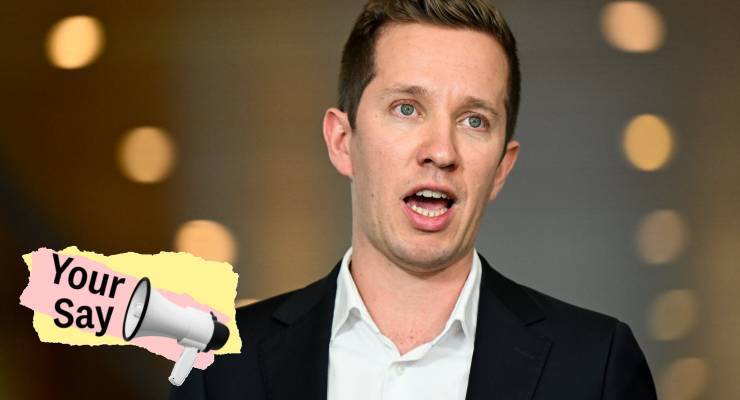
Priscilla Maxwell writes: As a baby boomer homeowner, I am delighted that my federal member Max Chandler-Mather has moved the housing debate into something worthy of the country and government’s attention (“Max Chandler-Mather, publicity hound with a nose for the kill, is winning on housing”). It is long overdue. I feel ashamed and distressed that we have so many homeless and rental-stressed Australians who have been progressively ignored over the past decade.
Where are the traditional values of a fair go and “no-one left behind” in the Labor proposals? What’s happened to building caring communities where a roof over each person’s head is non-debatable? As usual, it’s all about the money in big business and lobbyists’ pockets. Shame!
Humair Haris writes: The biggest benefit of the Albanese government’s housing fund is that it will be an enduring and off-budget source of supply of funding for social housing. That means no future government will be able to just cut housing funding because of budgetary constraints or ideological reasons.
Yvonne Parker writes: The last perfect storm for a housing shortage was post-World War II. What became obvious as soldiers and nurses came home from war and began to settle down was a drastic shortage of housing materials and houses. People were renting hovels in the slums of Carlton, Fitzroy, Collingwood, North Melbourne and Footscray and living — until it was abandoned in 1956 — in the Nissan huts of the disused military camp at Royal Park.
The Victorian government responded to the urgent need for affordable housing by first establishing a factory where tilt-up concrete slabs were made in Melbourne’s north. Those houses were quick to assemble. In little time Victoria had thousands of this standard of housing — most still stand. They filled suburbs such as Glenroy, Norlane, Corio and Braybrook.
Now, when tenants move out of a house in a suburb like Norlane, it seems that the government leaves it to deteriorate instead of refurbishing it. What follows is squatters move in, and/or it is vandalised, or burnt; then demolition, the block is sold and there goes another public house.
The slums have all been regentrified. The public housing areas sold off. The government is at a sticking point. It’s got to increase the planned spending now and start spending it yesterday. It’s that or watch tent cities mushroom — which will look much like the trailer park life of desperate living as portrayed by Frances McDormand in Nomadland.
John Gleeson writes: Max Chandler-Mather’s views on housing constitute the best single argument for proportional representation yet seen.
Pamela Curr writes: After years of fudging on the growing housing problem in Australia, Chandler-Mather appears like the boy who cried out the truth about the emperor’s clothes.
The fact is the myth of home ownership and fairness of shelter for all has been exposed. Both major parties have flirted with owners and investors but done little for the growing toll of renters. Now 30% of the population and rising, the time has come for some respect for those not earning enough to take on million-dollar mortgages or lucky enough to have the bank of mum and dad to help.
All power to the Greens for standing up for renters. Their time is now. No doubt the dirt diggers will be out seeking something nasty to tarnish Chandler-Mather. Hope they return to the main game and consider that renters deserve consideration too.
Vale Stuart Robert. You won’t be missed
Richard Barnes writes: Maeve McGregor’s article “An unfinished political obituary for Stuart Robert, a flat circle” was as magnificent as Robert’s career was appalling.
It is easy to dismiss Robert and his ilk as just another self-serving chap in a grey suit, white shirt and blue tie and fail to appreciate the depths of wickedness plumbed by the Abbott/Turnbull/Morrison governments. To quote McGregor: “[Robert] played his part in an earnestly destructive government that left in its wake a country decidedly less equal, less kind, more divided, crueller, deader and more corrupt.”
Malcolm Cowan writes: McGregor’s dissection of Robert was wonderfully clinical and also deeply disturbing. A question though: how does his behaviour reflect on the electorate that returned him? Where was its “moral compass”? Was it so disengaged it didn’t notice or care, or was it equally accepting that this was the accepted norm for an LNP politician?
Bill Hayes writes: Now that’s the sort of writing I can relate to. I love the way McGregor is able to call a spade a bloody great shovel and manage to smack those who deserve it fair in the face with it. Stuart Robert earned every hit. And boy can she swing that shovel.
The article attracted me as I had similar thoughts about Scott Morrison’s mate but lacked the writing skills to do my thoughts justice. McGregor’s writing has been one of my great pleasures in reading Crikey: always concise, straight to the point, and rarely misses.
Chris Lewis writes: Brilliant article by McGregor on Stuart Robert, one of the most embarrassing politicians in Australian history. “Immeasurable” best describes the damage he has done to the image of public office.
Tim Stephens writes: For a man who loves God so much it’s a pity Robert’s actions and behaviour epitomises most of the past 10 years of Liberal rule. A truly horrid individual.
Naomi Radunski writes: McGregor’s best point is made here: “The efflorescence of this crisis of moral collapse didn’t originate with Robert…” Robert, like Donald Trump, is not a cause; he is an effect, an outcome of a period of ethical turmoil where all systems of belief are under audit. Nevertheless, he is our effect.
People like Stuart Robert — too greedy to stop, too stupid to evade notice, and too unlikeable to engender loyalty — have helped remind Australians where at least to start rediscovering our moral barometer.








I fully endorse this reference to Maeve McGregor: “McGregor’s writing has been one of my great pleasures in reading Crikey: always concise, straight to the point, and rarely misses.” Keep up the great work, Maeve and Crikey.
Yes, but what’s happened to Guy Rundle?
I think Guy is in the sin bin.
Maybe, but why don’t they let us know? It’s all very well to be transparent about where our subscription money goes, but I’m more interested in the appearance and non-appearance of writers.
He had a severe case of honest integrity unsuited to the ‘house’ style where the MO is “never explain, never apologise, take the money & run.“